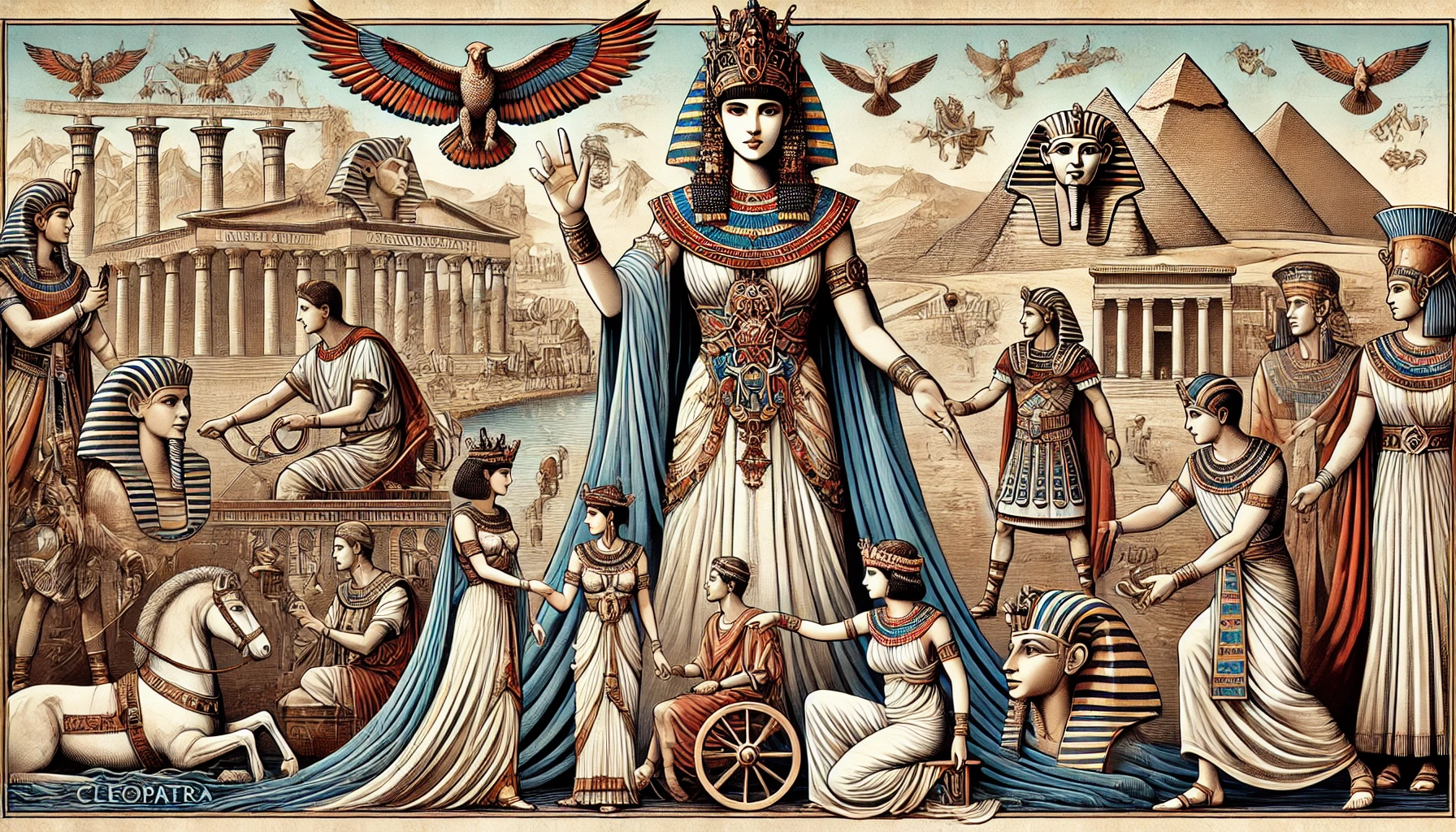Life of Cleopatra: Biography, Facts, and Timeline of Egypt’s Iconic Queen
Cleopatra, one of history’s most famous and fascinating figures, continues to captivate people around the world. Her life, filled with drama, power, and romance, offers a rich tapestry of historical events and personal achievements. This blog delves into Cleopatra’s biography, timeline, and key facts, shedding light on the life and legacy of Egypt’s iconic queen.
Cleopatra’s Biography: Early Life and Rise to Power
Cleopatra’s Early Life
Cleopatra VII Philopator was born in 69 BC in Alexandria, Egypt. She belonged to the Ptolemaic dynasty, a Greek family that ruled Egypt after Alexander the Great’s death. Cleopatra’s biography reveals a young queen educated in various fields, including philosophy, astronomy, and multiple languages. Her intelligence and political acumen were evident from an early age.
Ascension to the Throne
In 51 BC, following the death of her father, Ptolemy XII, Cleopatra ascended to the throne alongside her younger brother, Ptolemy XIII. The initial years of her reign were marked by political instability and familial strife. Cleopatra’s biography highlights her strategic maneuvers to consolidate power, eventually becoming the sole ruler of Egypt.
Cleopatra’s Timeline: Key Events in Her Reign
Cleopatra’s Timeline: Significant Milestones
- 69 BC: Birth of Cleopatra VII.
- 51 BC: Ascends to the throne of Egypt.
- 48 BC: Forms an alliance with Julius Caesar.
- 47 BC: Birth of Caesarion, Cleopatra’s son with Julius Caesar.
- 41 BC: Begins her relationship with Mark Antony.
- 40 BC: Birth of twins, Alexander Helios and Cleopatra Selene, with Mark Antony.
- 30 BC: Cleopatra’s death.
Cleopatra and Julius Caesar
In 48 BC, Cleopatra aligned herself with Julius Caesar, one of Rome’s most powerful leaders. This alliance was both political and personal, significantly influencing Cleopatra’s timeline and her reign. Cleopatra and Julius Caesar’s relationship strengthened her position in Egypt and provided military support against her rivals.
Cleopatra and Mark Antony
Following Caesar’s assassination in 44 BC, Cleopatra formed a relationship with Mark Antony, another prominent Roman leader. Cleopatra and Mark Antony’s union was both a political alliance and a passionate romance. Together, they sought to challenge the power of Rome, but their ambitions ultimately led to their downfall.
Cleopatra’s Facts: Insights into Her Reign
Cleopatra’s Intelligence and Education
One of the most intriguing aspects of Cleopatra’s biography is her intelligence and education. Unlike many rulers of her time, Cleopatra was well-versed in various fields of knowledge. She was fluent in several languages, including Greek, Egyptian, and Latin, and was known for her eloquence and persuasive abilities.
Cleopatra’s Political Acumen
Cleopatra’s political skills were instrumental in her ability to navigate the complex landscape of Egyptian and Roman politics. She skillfully used her alliances with Julius Caesar and Mark Antony to maintain her power and protect Egypt’s sovereignty. Cleopatra’s biography showcases her as a shrewd and strategic leader.
Cleopatra’s Achievements: Lasting Impact on History
Cleopatra’s Achievements as a Ruler
Cleopatra’s achievements extend beyond her famous relationships. As a ruler, she implemented various economic and administrative reforms that strengthened Egypt’s economy. Cleopatra’s achievements include:
- Economic Reforms: Implemented policies to stabilize the currency and increase trade.
- Cultural Patronage: Supported the arts and education, contributing to Alexandria’s status as a cultural hub.
- Military Leadership: Led her navy in the Battle of Actium, showcasing her leadership skills.
Cleopatra’s Legacy: Influence on History and Culture
Cleopatra’s legacy endures in many ways. Her life and reign have been immortalized in literature, art, and film. Cleopatra’s legacy is a testament to her enduring influence on history and popular culture.
- Literary Influence: Shakespeare’s play “Antony and Cleopatra” remains a classic, reflecting the enduring fascination with her story.
- Cultural Icon: Cleopatra’s image as a powerful and charismatic queen continues to inspire artists and filmmakers.
- Historical Impact: Cleopatra’s reign marked the end of the Ptolemaic dynasty and the beginning of Roman rule in Egypt.
Cleopatra’s Death: The End of an Era
Cleopatra’s Death: A Tragic End
Cleopatra’s death in 30 BC marked the end of her reign and the Ptolemaic dynasty. According to historical accounts, Cleopatra chose to end her life by allowing an asp, a venomous snake, to bite her. Cleopatra’s death was a dramatic and tragic conclusion to her storied life.
Impact of Cleopatra’s Death
The aftermath of Cleopatra’s death had significant implications for Egypt and Rome. With her passing, Egypt became a province of the Roman Empire, and her son, Caesarion, was killed to eliminate any threat to Rome’s control. Cleopatra’s death symbolizes the end of ancient Egypt’s era of pharaonic rule and the beginning of Roman dominance.
Cleopatra’s Enduring Fascination
Cleopatra’s biography, facts, and achievements paint a picture of a remarkable woman who wielded immense power and influence. From her strategic alliances with Julius Caesar and Mark Antony to her lasting legacy as an iconic queen, Cleopatra’s life story continues to captivate and inspire. For those interested in delving deeper into the lives of historical figures like Cleopatra, visit Regent Studies for comprehensive educational resources.




